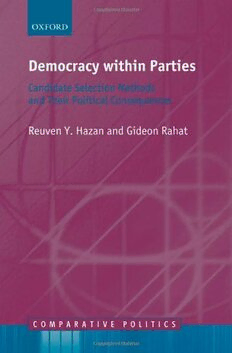
Democracy within Parties: Candidate Selection Methods and their Political Consequences (Comparative Politics) PDF
221 Pages·2010·1.883 MB·English
Most books are stored in the elastic cloud where traffic is expensive. For this reason, we have a limit on daily download.
Preview Democracy within Parties: Candidate Selection Methods and their Political Consequences (Comparative Politics)
Description:
Can too much participation harm democracy? Democratic theory places great importance upon the conduct of elections, but it is not often recognized that the electoral game takes place in two arenas, not only between parties but also within them. This pioneering book presents a new approach to understanding political parties. It sheds light on the inner dynamics of party politics and offers the first comprehensive analysis of one of the most important processes any party undertakes--its process of candidate selection. Candidate selection methods are the mechanisms by which a party chooses its candidates for the general elections. It may be the function that separates parties from other organizations. For such an important function, this field has certainly faced a dearth of serious investigation. Hazan and Rahat, the leading scholars on this topic, conduct an in-depth analysis of the consequences of different candidate selection methods on democracy. Democracy within Parties is a culmination of almost two decades of research and defines the field of candidate selection. Comparative Politics is a series for students, teachers, and researchers of political science that deals with contemporary government and politics. Global in scope, books in the series are characterised by a stress on comparative analysis and strong methodological rigour. The series is published in association with the European Consortium for Political Research. For more information visit www.essex.ac.uk/ecpr (http://www.essex.ac.uk/ecpr)The General Editor is Professor David M. Farrell, School of Politics and International Relations, University College Dublin.
See more
The list of books you might like
Most books are stored in the elastic cloud where traffic is expensive. For this reason, we have a limit on daily download.
